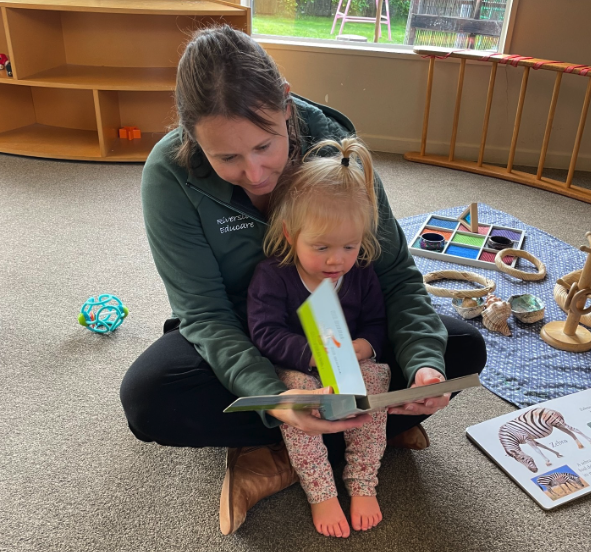
Resource—


At Riverside we embrace a philosophy embedded in the importance of nurturing growth and development in our tamariki. Rooted in Te Whāriki, Aotearoa’s Early Childhood Curriculum, one of the key aspects of our approach is primary caregiving. This all-important element builds those secure attachments, and recognises the impact that has on the holistic development of our youngest minds and hearts.
Te Whāriki, the guiding document for ECE in New Zealand, emphasises the holistic development of tamariki. It underscores the interconnectedness of the well-being of the child, their whānau, and the broader community. Within this framework, the concept of primary caregiving emerges as a pivotal element, helping us to build positive developmental outcomes.
Many studies illuminate the impact of secure attachments on the developing brain. The brain undergoes such rapid and extensive growth in those early years, and the quality of early relationships play a vital role in shaping neural pathways and influencing long term outcomes.

1. Secure Attachments:
Neuroscientific research consistently highlights the importance of secure attachments in the early years. Primary caregiving establishes a strong, trusting bond between teacher, child, and whānau, providing a secure base from which our tamariki can explore and engage with the world around them.
2. Responsive relationships:
Through primary caregiving, educators can build responsive relationships that are attuned to each child’s individual needs and cues. This responsiveness creates an environment where our tamariki feel seen, heard, and valued.
3. Consistency & Continuity:
Primary caregiving ensures a consistent and continuous presence in a child’s life at daycare for the time they are in that room, this is so important for their sense of predictability and stability. The consistency contributes to our Tamariki’s sense of security and belonging, all important factors in overall well-being.
4. Personalised Learning:
Understanding each child as an individual is central to our approach. Primary caregiving enables Kaiako to tailor learning experiences to the specific interests, strengths, and challenges of each child, promoting a learning journey that has each individual child in mind.
5. Communication and Collaboration with Whānau
Primary caregivers play a central role in establishing and maintaining open lines of conversation with whānau. This collaborative approach ensures that the home and ECE environments are aligned, creating a seamless and supportive experience for the child.

The transition from home to an ECE setting, or from room to room, can be a significant step for both tamariki and their whānau.
Primary caregiving eases this transition by providing a consistent and familiar face in the form of a dedicated caregiver. This continuity of care helps children feel secure and supported as they navigate new environments, routine, and relationships. By prioritising this approach, we nurture tamariki who possess a strong sense of self, resilience, and a love of learning.

How do you choose who will be my child’s primary caregiver?
We consider a lot of aspects, such as the time your child spends here and which kaiako that most closely aligns with, and what interests or unique needs your child may have and which kaiako may nurture those things in the best capacity.
Will my child develop relationships with other teachers in the centre?
Yes! All staff are responsible for the care and well-being of each child. On some days, a child’s preference for who they go to for care moments may change. The primary caregiver just has that extra special relationship with their tamariki.
Shouldn’t teachers give care and attention equally to all the children?
Yes and no! The relationships between tamariki and kaiako is so important and one of the things we recognise fully here is that children are unique individuals with varying needs. Primary caregiving ensures needs (including cultural and disability needs) are identified, understood, and met. Of course, all kaiako build relationships with each child, but this approach makes sure that your child has that person who is their home away from home.
What happens when the primary caregiver is sick?
Mostly tamariki will continue as usual. Primary caregiving lays the foundation for that sense of security here in the centre and the benefits of that process exist even when that person isn’t there. For children that really rely on that strong relationship, it’s common for them to have at least one other kaiako who they have developed a bond with and if their primary caregiver is unavailablem this person can step in for care moments with ease.
Why are secure attachments so important?
Research has found that in order for tamariki to become resilient persistent and independent, they first must be able to depend on the main adults in their life. Children need at least one adult to meet their needs and, ideally, this adult will always be nearny. Usually this would be a family member; however, in an ECE setting when parents are not present, kaiako take on that responsibility to support a child’s emotional wellbeing.








